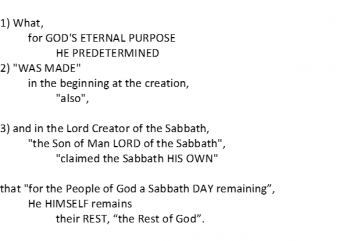Just making sense of Isaiah 1:11-15
Not only that, but the Jewish praxis is very similar to other ancient cultures. The difference, I presume, is that God redeemed it to serve his holy purpose. This is similar to what he did with the city. Bear in mind, the concept of a city was Cain's idea and has always been a place where bad things happen. But in the end, God will redeem the city and make it something wonderful. See "The Meaning of the City" by Jacques Ellul for instance.
Isa 1 is not difficult. It is God, acting the part of a man irate over meaningless gifts passed to him, to cover up insincerity and back-stabbing. "I hate your feasts." In other words, I hate the pretense of religious worship, the feigned love for Me, when really you haven't changed. You haven't given up your own independent ways of sin to live for me, in true love and righteousness.
God wasn't saying He hates formal religion and ritual. He was saying He hates *dead religion,* or *false religion.* It was expressed like an exasperated man who says to his faithless wife, "I can't stand you any more!" But in reality, the man loves his wife and longs for her to return to her 1st love.
At some point God actually does fall out of love with many of the Israelis, and casts them away forever, because they have no thought of returning. They've made their decision, and so they're banished. This is all that's being said. We shouldn't read more into it than is intended by the context.
There is no real antagonism being expressed here for the Law. The Law was precious both to God and to the worshipers of God because it was the means of reconciliation, and the means of pleasing God. It was the basis for a temporary covenant relationship that existed in the hope of a better, eternal one.
That's why the longest Psalm of the Bible is dedicated to expressing love for the Law in a multitude of ways. Psalm 119. To understand the heart of God is to hear Jesus say, with emotion: "those who do these requirements the least shall be least in the Kingdom of heaven." If Israel wanted to please God under the Old Covenant, it was by loving the Law.
Today, we express the same kind of devotion in embracing the Kingdom of God alone, and its righteousness. If we do, then "all these things shall be added to you."
The Apostle John, in 1 John, expressed the importance of not just saying you love God, but by expressing these sentiments by obeying Christ's commandments, and by devoting ourselves to be like him. Loving the Law in the OT is loving God's word just as it is in the NT. It is all about loving God's word to us in whatever time we find ourselves. It isn't, of course, just a ritual, or a catelogue of rules. Much more than that, it is God speaking to our conscience.
If God so spoke to Israel, verbally, in the OT to Israel to keep rituals, this was just as important as following God's word to our conscience today. Anyway, this is how I think about it. Just wanted to share that.


